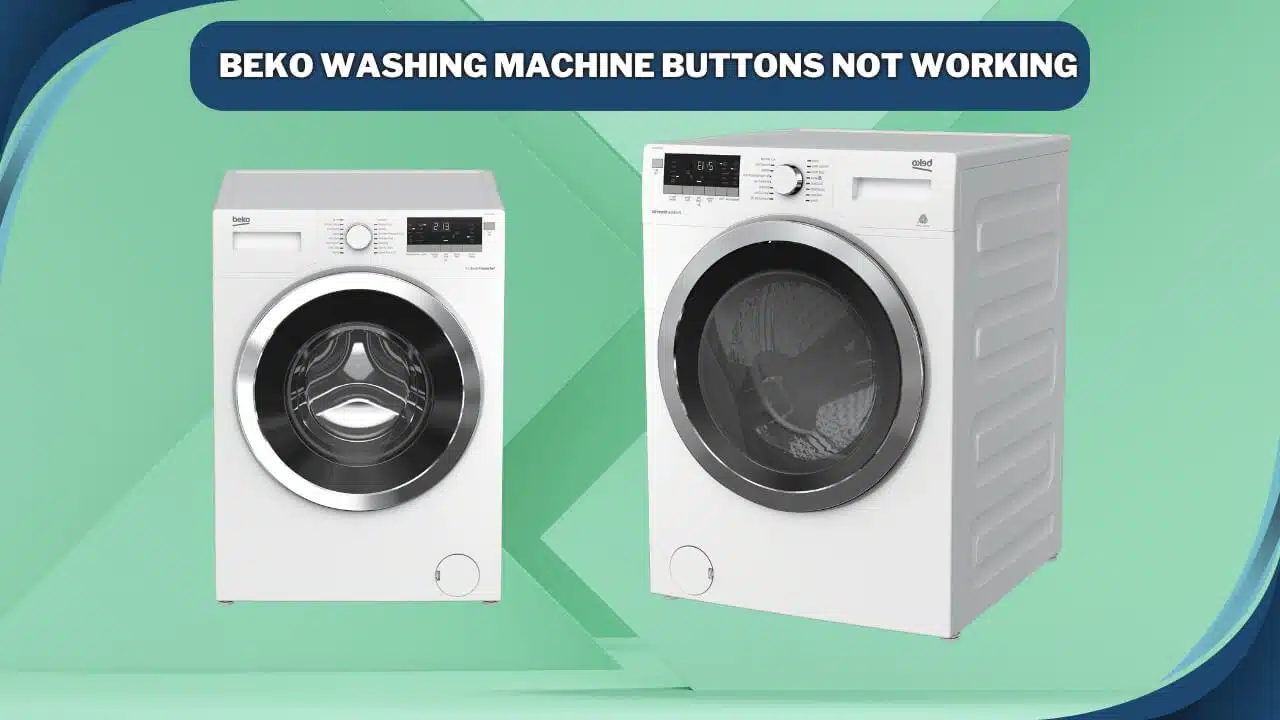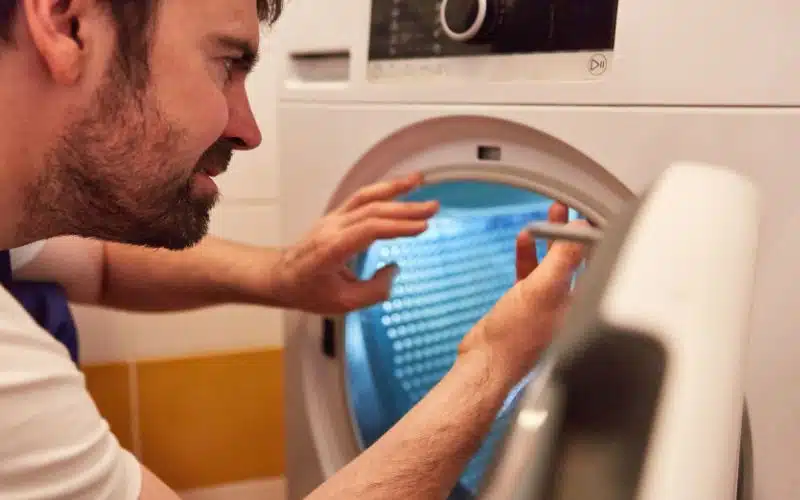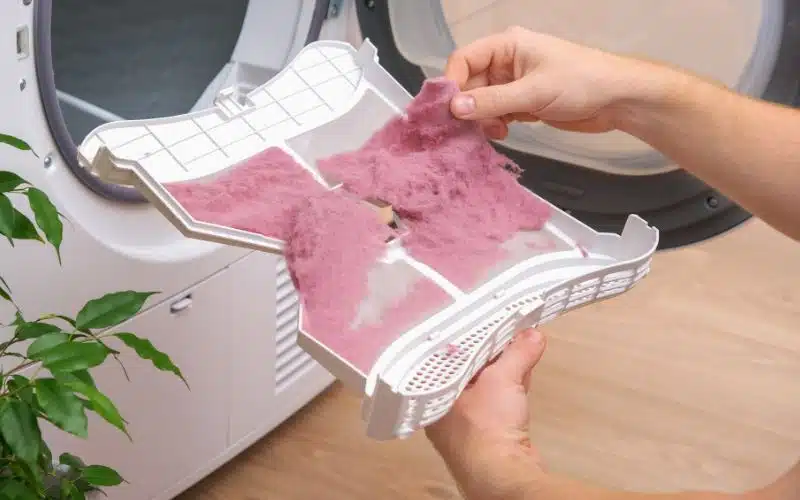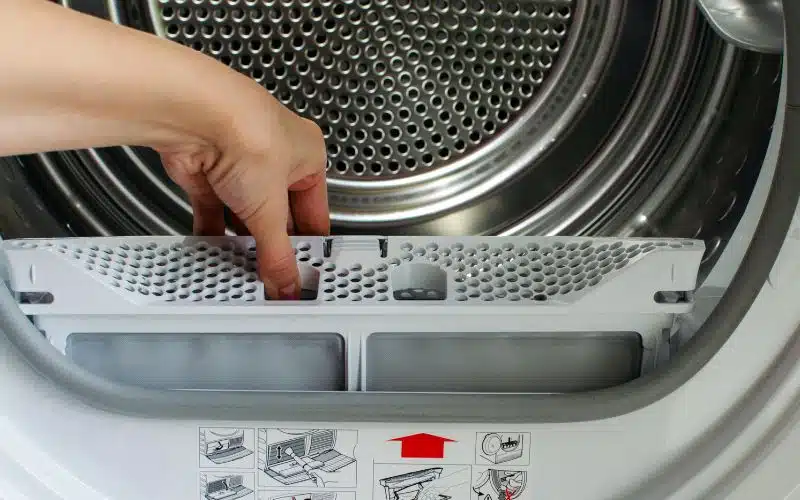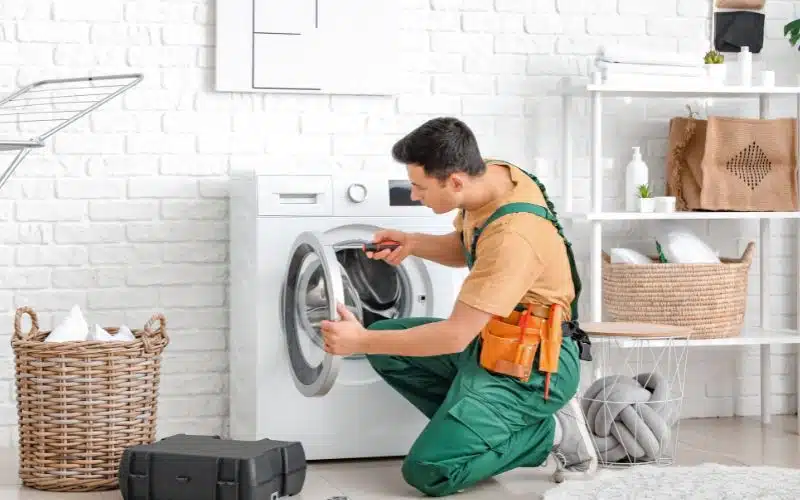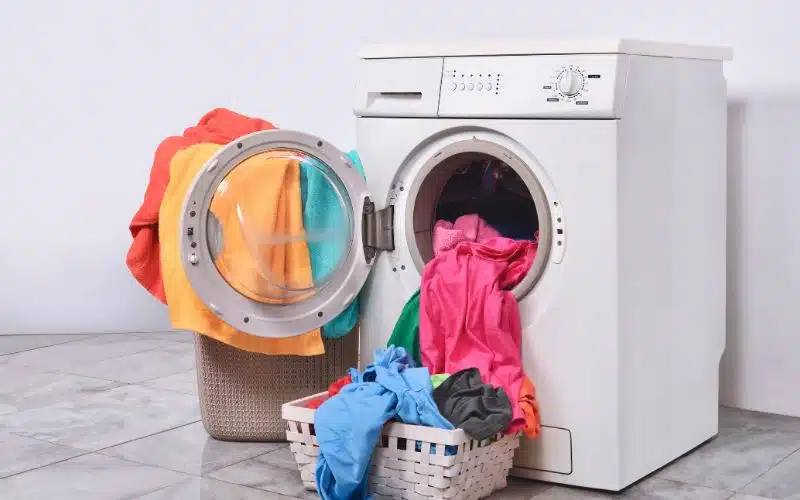Have you approached a crossroads in your life while purchasing a washing machine where you end up considering the question above?
Perhaps you are about to launder cloth to remove stains, which may require hot water. Or you likely found out the washer has one hose only for cold water supply.
Consider purchasing a machine that requires a hot and cold water supply and can heat water by itself.
Yes, of course, washing machines heat their water. While most washing machines come with plumping and a hose that allows for a separate supply of hot and cold, other models heat their water. These washing machines contain internal heating elements and can heat the water during their washing cycles.
As the article progresses, we will examine the machines that heat their water, how to identify when it is heating water, and whether hot water can damage your washer.
Do Washing Machines Usually Heat Their Water?

Yes, recently, many washing machines can heat their water like the washing machines in Europe that have only one hose for cold water and heats its water.
The location of your stay is vital in determining the type of machine you use. It would be a washer that takes water from the home’s heater for US citizens.
Nevertheless, there are still washing machines that, even though they have two hoses to supply hot and cold water, still have heating elements.
With this heating element, some washing machines can heat water up to 90oC. And this is a 30oC increase from the 60oC temperature of tap water.
Which Washing Machines Heat Their Water?
Searching for washing machines with in-built heaters will discover that almost all front load washers come with in-built heaters.
There are very few top load washers that come with this in-built heater. But with the example I give you, you will see the best washing machines with the heater you should go for.
Washing machines with heaters perform very vital roles. For instance, they soften the fabric and remove tough stains from clothes.
Also, when above 80oC, they can get rid of bacteria and enzymes. Now, let us consider some of the best washing machines with in-built heaters.
#1. Whirlpool Top Load Washing Machine
It is a budget-friendly washer that is perfect for a family of four since it has a carrying capacity of 7.5kg.
It runs on 12 programs, among which include the following;
- Heavy wash
- Eco wash
- Woolen wash
- Daily wash
- Anti-bacterial wash
- Stainwash
- Bedsheets
- Delicates
- Whites
- Rinse + spin
The Whirlpool top load washer stands among rare available top load washers with in-built heaters. In this whirlpool, there are three levels to heating your water.
Hot, warm, and allergen-free are three levels, with hot being the maximum level at 60oC. This hot water washes easily and removes oil, ketchup, and grease stains.
In the hot wash, the process begins with soaking clothes in a solution of detergent and water. And this happens just before the agitation process kicks off.
It is also very effective in washing with just ⅓ of the water you will use for a standard wash program. And if you stay where only hard seems to be available, you can still wash clothes.
The hard water wash technology of the whirlpool in this washer allows it to wash clothes with hard and soft water. It also has an intelligent lint filter for cleaning lint after a wash cycle.
The table below shows the pros and cons of the Whirlpool top load washer;
| Pros | Cons |
|---|---|
| Budget-friendly to users/ family | Fails to dry clothes 100 percent |
| Magic filter | |
| The soft lid at the lock | |
| Hard water wash technology |
#2. Bosch Front Load Washing Machine
Bosch front load washer is a functional, stylish, and fully automatic front load washing machine with a carrying capacity of 7kg.
It comes with a hot water wash program with a form that guarantees strength and durability. It comes with 15 wash programs with consideration for various fabrics.
The good news is that this washer still performs well with low water pressure and gives excellent washing. And does not make any noise or vibration from the spin.
One thing I like about the Bosch front load washer is that you can remove and add clothes during the early stages of a wash cycle.
With Bosch, you can clean your laundry with 20 percent less energy and reduce the cleaning time by 65 percent. And while washing, the EcoPerfect can save up to 50 percent of energy.
| Pros | Cons |
|---|---|
| Budget-friendly | It has a smaller capacity |
| No noise | |
| It has a reload program. |
#3. IFB Top Load Washing Machine
IFB is a perfect and ideal choice for smaller families with two members since it has a capacity of 6.5kg. Its filter treatment helps detergents to dissolve faster and better.
IFB also features the following eight wash programs;
- Quick wash
- Normal wash
- Wool wash
- 3D washer
- Triadic pulsator
- Aqua Energie
- Lint filter
- Smart sense technology
The Aqua Energie feature is a small device inside the washer that plays a crucial role in helping your detergent to dissolve faster.
The triadic pulsator cleans the laundry better by removing the dirt from the core and removing dirt from the sides. And thirdly, it flushes out all residue.
If your home has kids in it, this washer is ideal because it allows you to pause a wash cycle, open it and add more laundry.
And the Float Ball Valve technology lets water out while keeping detergents in, thereby preventing waste and enhancing wash.
| Pros | Cons |
|---|---|
| It has a four years warranty | It has terrible servicing |
| Budget-friendly | |
| It has Smart Sense Technology. |
#4. Samsung Washing Machine
It is a front-load washer, and although it has a capacity of 6.5, it’s pretty high in price and an ideal standard for a family of two to three.
It offers better cleaning and features like ceramic heaters in its machines, and what’s great is that file and humidity can not cause ceramic to rust.
You can wash and dry your clothes within 90 minutes. The cleaning and drying lasted just 15 minutes. And it effectively saves water and energy, no wonder it comes with a five-star energy rating.
It would be best if you cleaned the washer at the end of every 50-wash cycle or at least once every month. And also, try hard to clean the drum thoroughly with hot water.
| Pros | Cons |
|---|---|
| So many advanced wash programs | Makes noise |
| Performs well with low water supply | |
| Better cleaning performance |
How Do I Know If a Washing Machine is Heating Water?
If your washing machine is not heating water, its washer will be unable to deal with dirt or stains. But this failure is definitely because of one or more of the following reasons;
- When the washer has a faulty heater
- When there is a faulty control board
- When the temperature sensors are not working as they are supposed to
- When there is a problem with the wiring of the washing machine
How do I tell which among the four above is the real cause of my problem? Well, that is what we will now address.
#1. Faulty Heater
The first thing to do would be to test the heater. To do this, you must first locate your heater, which could be anywhere for different washers, and then follow these steps;
- Get a multimeter in hand and switch off all electricity.
- On locating the element, remove all connections to the elements
- Make sure your multimeter is at a low resistance setting
- Touch probes of the multimeter against the terminals
- Everything is normal if your reading falls between 20 to 50 ohms.
#2. Faulty Temperature Sensor
Water heating is an activity under the control of thermal sensors, and you would usually find it near the element.
To see if it is at fault, do well to follow these steps;
- Set your multimeter on a higher resistance
- Please take out the thermal sensor from its plug
- You should take a reading by inserting the multimeter’s probes within the sensor. If the reading exceeds 6,000 ohms, it is normal. But the usual should be between 20,000 to 50,000 ohms.
- Then lower the sensor in water, and if the multimeter’s reading drops, you have a perfectly functioning sensor.
#3. Faulty Wiring
You must move to the wire if the two above are not the problem. And this may prove to be a challenge if you need basic knowledge of wiring.
Note that every brand has its way of wiring; thus, you must conduct appropriate research on the machine’s wiring before opening it up.
#4. Faulty Control Board
A faulty control board is straightforward to identify. The moment you pick up the board and start searching for damaged parts, it may be in the form of a melt or scorch.
And then, pick your multimeter and try to confirm if the main fuse is working. No response automatically means that your control board is faulty.
Does Hot Water Damage Washing Machines?
Hot water does not damage washing because these machines have a design that allows them to use hot water for washing. And this damage can occur when you go over its temperature limit.
But there is no doubt that hot water will cause an increase in the growth of mold, grease, and terrible smells.
To tackle this, you must use conventional cleaning methods for the drum, which may also result in more expenses.
Final Thoughts
Washing machines can heat their water by employing internal elements within themselves during their washing cycles.
Most load washers heat their water, while only a few top load washers can do so.
To know if your machine is heating water, you must test for the faulty heater, temperature sensor, wiring, and control board.
